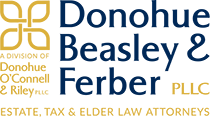Many people choose to bequest to extended family members and charities in their will. But did you know that estate planning should also include certain information that can make the process of disbursing funds faster and easier for survivors?
Providing for Extended Family Members
When providing for extended family members, it’s good to keep certain things in mind. Doing so will not only facilitate the executor in disbursing funds, but it may even prevent confusion and/or resentment in your other beneficiaries. Here are the things to keep in mind:
Extended Family Members May Be Unknown to Immediate Family
For a variety of reasons, extended family members may not be known to your immediate family. So it will be confusing for them to understand why your will bequeaths assets to a “stranger.” To avoid this, you can specify in your will the nature of your relationship, and the reasons for the bequeath. For instance, “John Philip is my step-sister’s cousin. Though we grew apart over the years, I fondly recall our childhood years during which he was my only friend in difficult times.”
Extended Family Members May Have Moved or Changed Names
One job of an executor is to track down beneficiaries. If you are giving to extended family members, it’s helpful to elucidate their possible whereabouts and last known contact information to streamline the process. This can be done with an addendum. On it, list maiden names, married names, parents, children, and last known addresses, emails, and contact numbers for the beneficiary.
Providing For Charities
If you choose to leave a portion of your estate to a charitable organization, know that you have several avenues to do so. You can designate a one-time lump sum payment to the organization, request repeated smaller payments over time, or even create your own charitable trust. However you choose to provide for a charity, there are some details that you can help with by including them in your estate planning.
List the Official Name of the Charity
There are so many charitable organizations now that many of them have similar names. This can be confusing for someone unfamiliar with the organization. Be sure to mention the official, full name of the charity, not just the “slang name.” For instance, instead of “St. Jude’s,” which could be interpreted to mean St. Jude’s Church, say “St. Jude’s Children’s Hospital.”
Include the Charity’s Tax ID Number
Charitable organizations must report donations to the IRS, although they usually do not have to pay taxes on them. Have your estate planning attorney take the time to look up the charity’s official tax ID number. This will save a step in reporting the bequest to tax officials and help to get your other bequests out to your other beneficiaries faster.
Contact Us for Assistance with your Estate Planning
We are here to help you prepare your will and trusts so that your assets will be distributed according to your wishes. Contact us to schedule an estate planning appointment.















